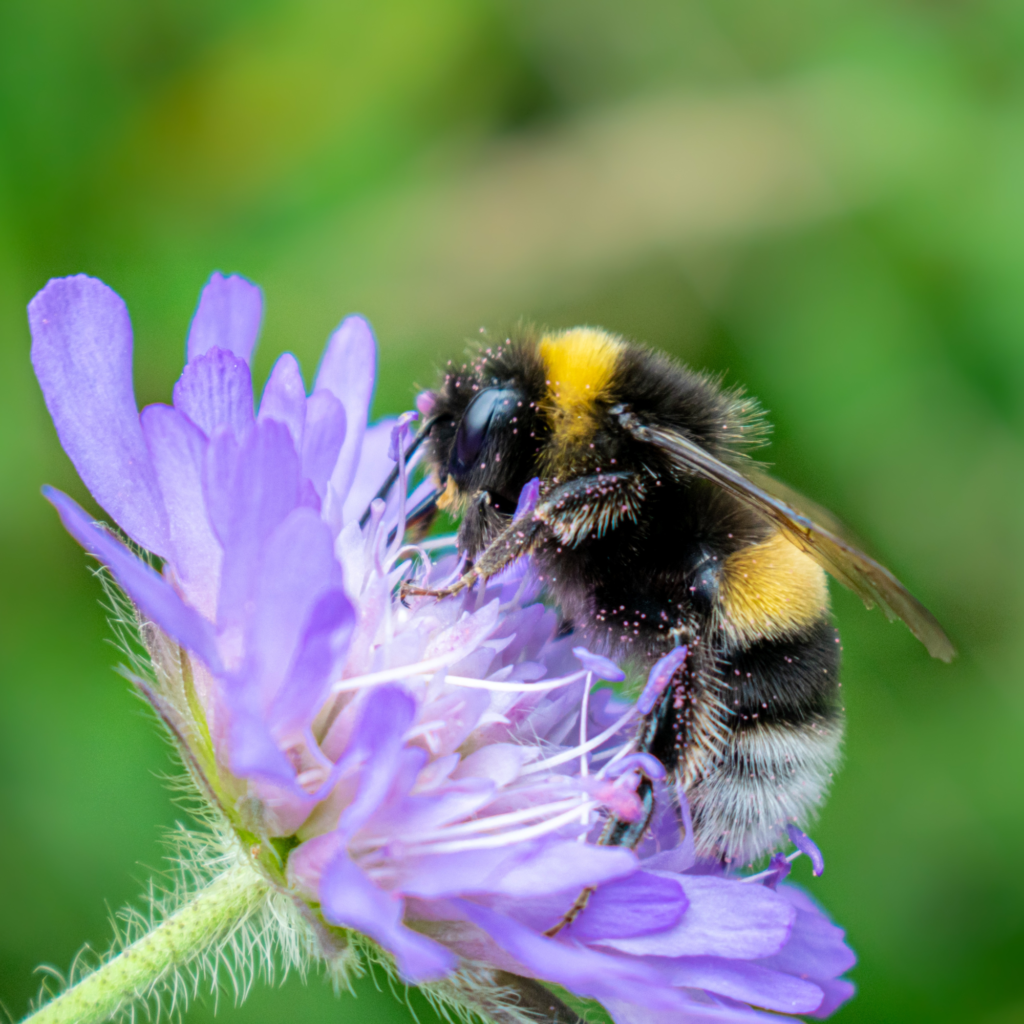
Did you know there are over 20,000 bee species throughout the world who work to pollinate one-third of our food sources? Honeybees, sweat bees, mason bees and carpenter bees are the most common species you will see in our area.
Other common species of bees in the Pacific Northwest include:
- The black tail bumble bee (Bombus melanopygus) is generally robust and hairy, giving them a somewhat fuzzy appearance.
- The fuzzy-horned bumble bee (Bombus mixtus) has muted yellow and black colors with a horn on its head.
- The yellow-faced bumble bee (Bombus vosnesenskii) features a prominent yellow face.
- The California bumble bee (Bombus californica) has two stripes of yellow on the head and tail with black in the middle.
- The blue orchard bee (Osmia lignaria) is a rare blue and black color.
Question: Why do bees swarm?
Bees swarm when the hive is running out of room. When the colony starts to get too large, the existing queen and half of the bees will leave to find another home. This phenomenon allows the colony to reproduce, and ultimately survive and thrive. Both the original colony and the swarm colony will have their own queens, resulting in more bees being produced.
Question: Why do bees build hives?
Honeybees attract predators because they produce honey, so they may build hives inside structures and trees for protection.
Question: What if I see a beehive or swarm?
First, observe! If they are honeybees, they are relativity harmless (unless you have an allergic reaction). If you can let them stay, please do so they can continue their essential work of pollinating our world. Keep your distance and don’t provoke the hive. Bees are less active on cooler days, causing their activity to vary depending on the weather. If you are concerned about a beehive, consider contacting a local beekeeper or pest control professional for assistance.
If you see a beehive or swarm on common areas like parks, equipment or landscape, please contact the IHCA office. Lyle Dickey, our landscaping supervisor, is trained to identify bees. He will come onsite and determine the species of bee.
If the bees do not pose a safety risk, such as being directly on or adjacent to park play equipment, we will allow them to continue their work. To ensure safety, the area will be secured with caution tape and signage. We ask that you do not disturb them. We will monitor the situation, and once the bees are gone, we will remove the barriers.

Honeybees, sweat bees, mason bees and carpenter bees are the most common species you will see in our area.
Question: What is the life span of a bee?
Queens can live for several years. Other bees live only 6–8 weeks, depending on their role in the hives.
Question: Which bee species are dangerous?
If you have ever been bitten by a yellow jacket wasp, you will not forget it. They bite fast, rapidly and can sting multiple times in a row, leaving very painful sting sites that can last days. Although not as prevalent in the PNW, they can show up occasionally.
Murder hornets were first detected in Whatcom County in 2021. These are large hornets, two inches long and three inches wide. If you suspect you have seen a murder hornet, keep away and notify the Washington State Department of Agriculture at 360-902-1800.
Question: What can I do to welcome local pollinators?
Plant a bee-friendly garden. Check with your local nursery for plants and flowers that attract bees.
- Add a bee hotel for those lone travelers without a hive to call home. Hotels can be a refuge or a short layover.
- You can purchase them through Amazon.
- Educate yourself and your family on the importance of bees and what to do if you come across them.
- If you see a nest or swarm, call the IHCA office. We will come to your home and assist in identifying the type of bee.
- Know the laws! Removing a honeybee hive can be illegal. Contact a local pest control company instead.
- Stay bee positive!
By working together, we can continue our commitment to a greener community and help ensure the longevity of pollinators traveling through our little corner of the universe.
As published in summer 2024 Connections >>>
Sarah Hoey is executive director of the Issaquah Highlands Community Association (IHCA).





